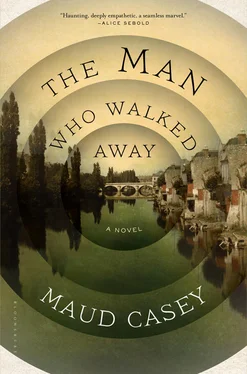“Your hovering exhausts me,” Marian says, grateful for the way he exhausts her. “Would you get me my hat?”
In the common room, Elizabeth has moved on to a different puzzle; the funicular in Lyon may have brought on the violence of the morning. The new puzzle is quite simple, a picture of people drinking in a café—how dangerous can it be? She will begin to put it together soon; for now, she is content to listen to Rachel, who, having announced that her frog is dying, is playing a piece from Chabrier’s Pièces Pittoresques, to bid it a bittersweet goodbye.
Soon the frog will be gone, Rachel thinks. “I am tired of this argument anyway,” she says. Nurse Anne, setting the table for breakfast, now lunch, may have been partly right after all — no one wants to argue with a frog. But what will be left when the frog leaves Rachel? What will be left when it dies? As Nurse Anne would also say, tomorrow will bring a new day. And so Rachel continued to play.
There is no argument in Albert’s room. There is only this: Albert lying on his bed and the Doctor sitting in the chair, which he has pulled up next to the bed in order to lay a hand on Albert’s shoulder. The only sound is the tick, tick, tick of the Doctor’s pocket watch, keeping track of the minutes, which seem beside the point, and so the Doctor slips the watch out of his pocket and puts it on the bedside table next to the water pitcher.
“My father only struck me once,” Albert says, sitting up.
“Shh, Albert. Lie back. You are safe now.”
“Because I wandered off. The next morning I pretended to be sleeping when he came into my room. I wanted him to touch my shoulder to wake me.”
“Albert.” Gently, the Doctor pushes him back.
“He took me down to the river to admire the gas lamps,” Albert continues. “‘Pay attention,’” he said, because I almost walked into a lamppost. I was still only half awake. He pinched my ear, not hard but firm, as my mother used to. He must have remembered it was something she used to do, because he said, ‘She only needed to look at me to untwist me.’”
It’s all any of us want , the Doctor thinks. Mother, I am frightened . Untwisted and buckled. You are better now.
“He started to tie me to make me stay, to keep me from going.”
“He wanted to keep his boy safe,” the Doctor says. He closes his eyes; there, the faint outline of a ship rocking on a turbulent sea. On the ship, a different boy dreams of safety.
“The night he died, I broke free, but it was too late.”
“Shh, Albert, shh.”
“I couldn’t stay. I left him there.”
The Doctor hadn’t looked back after he escaped the flapping unbuttoned cuffs of the incompetent country doctor. Not until he was in the Toulouse railway station, but even then he didn’t look back for long, because he was on a mission to — to what? He’s not even sure; it was so long ago. By the time he hopped on board the Niger , there were nights he thought he would hurl himself into the ocean, until the ship’s doctor told him what to do.
“Is Marian angry?” Albert says.
“No,” the Doctor says. “She was just frightened. Frightened as you were frightened. She’s not angry at you.”
Albert sits up. “But I came back,” he says, as if something has just occurred to him.
“Yes,” the Doctor says. “You were right here when I came in.”
“No,” Albert says. “I came back. I came back, to lay my father in his bed after he died.”
“You should sleep now,” the Doctor says. He isn’t sure if Albert is telling the truth, but the truth seems as relevant right now as his ticking watch. Was Albert returning any more unlikely than walking seventy kilometers in a day? Was it any more unlikely than wandering from country to country? Why not help him tell his story? “You were a good son,” the Doctor says.
“Yes,” Albert says, lying back. “I wanted to be.” He closes his eyes.
The Doctor stays with Albert until he falls asleep, watching his face as he moves through the depths of his own mysterious solitude. What does he dream of? the Doctor wonders. Does he dream of walking? The tight, winding streets pressing in on him until he passed through the ancient gate of the city, the arch underneath the giant clock of the church of St. Eloi tolling all the hours— les armes, les jours, les heures, l’orage, les fêtes, l’incendie. Does he dream of walking through orchards with shapely pears that offered themselves to him; apple orchards with knotty branches hanging low; plum trees with fruit so vibrantly blue they are almost black? Does the rhythm of his walking fill his head underneath a sky so blue it swallowed the earth? In his dreams, does he taste the sweetness of the world? The Doctor hopes that in his dreams Albert is astonished by how much more to the world there is than the houses built to keep it out.
As Albert begins to snore, the Doctor’s own dream from the night before returns to him — he is in Paris, jostled by crowds of people as he wanders aimlessly down streets that smell of horses and sweat. Where is he going? He walks to the Place de la Concorde, enters a restaurant, and orders a beefsteak, the most delicious beefsteak. Afterward, he walks to the Seine, where somehow he knows he is meant to dive in, but it looks so cold. He does not want to, but the riverbanks are crowded with people whispering, waiting. Are they waiting for him? Through their murmuring runs the gurgle of the river. He is the spectacle they’ve come to see. And then, the whisper of a familiar voice. He turns, and there is Albert. “Wait,” the Doctor says, but his voice is a frustrating dream whisper. “What did you say?” He pushes through the crowd, but Albert is gone.
He puts a blanket over Albert, stepping lightly so as not to wake him as he gathers his father’s watch from the bedside table. There is something he needs to do. “I will be right back,” he tells Nurse Anne on his way out, and this time he means it.
Click-clickety-click, the Doctor pedals all the way down to the river, where the ships’ sails snap and the boats creak as the current pulls and pushes. Tick, tick, tick — was it now? Did his father die now? The Doctor can never go back; he isn’t sure if Albert did either. Did it matter? For once, the uncertainty doesn’t bother him. He is not a careless man. He rides beside the river’s current, his lungs scraped by the air. He imagines his elegant clavicle and scapula; his vertebrae — the subtle curve of the cervical, thoracic, and lumbar; the delicate birdlike bones of his feet — the tarsals and metatarsals; the coral bone of his femur, all of them snapping in two, then four, then eight and on and on, until he is a pile of tiny bones that one of the horses clip-clopping down the street crushes underneath its hooves, grinding him to dust.
But there again is Albert’s face, falling away from the world into sleep, into his own peculiar and wondrous mind. The thrillful boy the Doctor once was, his father on one side, his mother on the other, waiting eagerly for the great Léotard to come riding over the horizon; Albert has brought this boy back. The Doctor reaches into his pocket for the warm ticking smoothness. He wraps his hand around it — now, now, now? He will never know, but something has shifted. The restlessness that ached for the precision of the tumbler lock clicking into place has subsided; now he longs to be astonished like that thrillful boy, like Albert. Now? Now? When did his father die? It’s the wrong question altogether. As he pedals beside the river, the question blows away, and the Doctor throws the watch as hard and as far as he can. The current is swift and the watch is gone just as swiftly, riding along just underneath the surface of the current and then sinking to the bottom of the river, where it lodges in the silt and is buried.
Читать дальше












